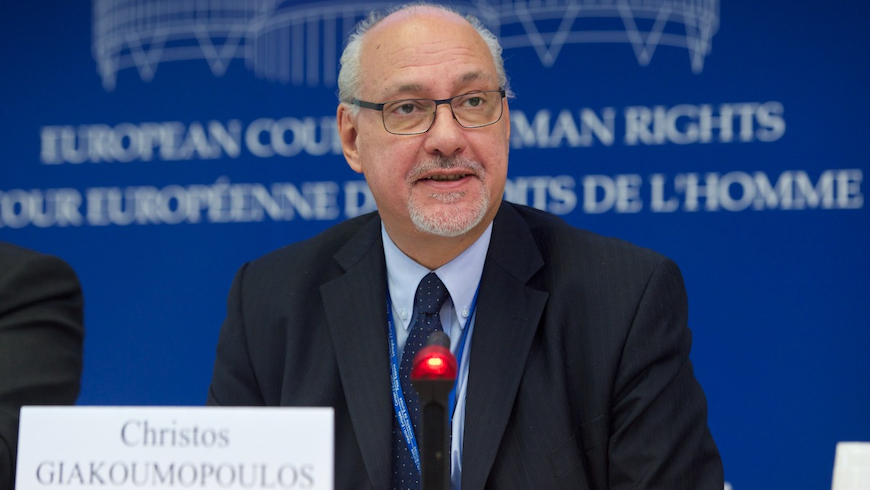Speech by Christos Giakoumopoulos
Human Rights in Sport: Issues on the Agenda
16 May 2018, Saint-Petersburg International Legal Forum
Dear Deputy Minister,
Distinguished Members of Parliament,
Excellencies,
Ladies and Gentlemen, dear colleagues,
We have only just held a session dedicated to the 20th anniversary of the Russian Federation’s accession to the European Convention on Human Rights, an important milestone for both Russia and Europe. I find it quite symbolic that we take over with another session co-organised by the Council of Europe to deal with a topic of great current interest – human rights in sport.
ECHR and Sport: Need for new Guidance at the European Level?
You are aware that the Council of Europe is a pan-European organisation which entertains the common European legal space composed of some 200 binding conventions and many more so called “soft-law instruments” that frame our member-States’ activities in virtually all spheres of our life. Sport is not an exception.
Just a recent example of relevance to Russia: one of the last conventions of the Council of Europe to have been ratified by the Russian Federation a few months ago was the one dealing with an integrated safety, security and service approach at sports events. Other Council of Europe sport-related Conventions are the Convention Against the Manipulation of Sports Competitions, the Anti-Doping Convention and its Additional Protocol
Hence, the Council of Europe has much to say about all those matters. However, our session is supposed to deal with the question of human rights in sport; that is why I will focus my intervention on the implications that our main Convention – the European Convention on Human Rights - may have in the area of sport activities.
It is common ground that sport activities are not mentioned in the European Convention on Human Rights (ECHR). The latter was signed back in 1950 when sport did not take such an important place in human lives. For the very same reason, the Convention did not deal, for example, with digital data protection or other numerous modern questions such as bioethics.
That being said, the Strasbourg Court has consistently held the Convention to be a living instrument to be interpreted in the light of the present day conditions. This is what made the Convention a remarkable development in international law and what still makes it so relevant nowadays.
Hence the Strasbourg Court has been confronted with numerous human rights issues in sport as the latter increasingly affects human lives.
Indeed, sport-related activities increasingly raise legal issues under the European Convention on Human Rights with an increasing number of cases being brought to the European Court of Human Rights. Right to respect for private and family life, freedom of expression, property rights, the principle of “no punishment without law” are invoked by athletes. Of paramount importance is the right of athletes to a fair trial and to an effective remedy at the national level to get their Convention rights protected.
The Fact Sheet issued by the Registry of the European Court of Human rights, which is available in the room, would provide you with a more detailed account of cases already decided by the Strasbourg Court on sport-related human rights issues and, even more importantly, on a wealth of yet undecided cases pending examination by the Strasbourg Court.
Given the number of such issues, we feel in the Council of Europe a need for clearer international legal guidance to protect human rights of all those involved in sport activities. And there is a hope that the Strasbourg Court will inevitably continue to build up its case-law on such questions, thus contributing, as it did in many other areas, to the protection of human rights of athletes who at times find themselves as a very vulnerable group of people.
Sport is usually considered as having much autonomy from States’ regulations. But this autonomy is limited, when sport is viewed in terms of its manifold impact on human lives.
Today the powers of sports organisations to set rules, monitor and penalise athletes are very extensive and therefore the actions of these organisations might encroach on fundamental rights so much as to engage the responsibility of public authorities. This is at least the rationale behind the various complaints being lodged with national and international courts.
Numerous questions arise in that regard. What is the interplay between the rules of sport and other international and national rules? What is the courts’ jurisdiction for ensuring compliance with those rules? To what extent do the norms of international law apply to the rules of sport?
Of course, neither the Strasbourg Court nor the Council of Europe is probably well placed to answer all these questions. As you know, the Court does not give abstract rulings, it always decides on the basis of the specific circumstances of a given case. However, once a violation is found, the respondent State is usually called to take general measures to remedy structural problems at the basis of the violation found. This is how judgments of the Strasbourg Court triggered thousands of legal reforms in all 47 States of the Council of Europe.
The number of cases already decided by - or still pending before - the Court would suggest that the European Convention system would and should definitely contribute to the protection against arbitrariness and ensuring proportionality of restrictions on human rights in the sporting area.
I would therefore invite all those interested in sport legal issues to follow closely the future developments under the European Convention on Human Rights in the relevant cases.
HELP New Course on Human Rights in Sport
Meanwhile, I would also like to share with you a very important development which was initiated by the Council of Europe to enhance the awareness-raising and training on rights and obligations in sport.
At a high-level meeting in Kazan last summer,[1] our Deputy Secretary General Ms Battaini-Dragoni announced a proposal to develop a new, tailor-made curriculum on rights and obligations in sport, so that high quality education and training to combat doping be made accessible to all: athletes, coaches, legal professionals and more.
This initiative was based on two important premises.
First it is based on the Anti-Doping Action Plan which has been agreed by the Council of Europe and the Russian authorities since last year. This Action Plan aims in its third pillar at designing education programmes in sport-related areas. As we all know, education cannot do everything, but one cannot do anything without education. We therefore attach tremendous importance to the third educational pillar of the Anti-Doping Action Plan.
The second premise for our joint initiative is the role played by the Council of Europe HELP Programme as a unique pan-European platform offering a new type of on-line training and education. The HELP programme initially targeted legal professionals but is being increasingly extended to other fields.
The new course on the rights and obligations in sport will benefit from the Council of Europe’s extensive expertise on sport-related issues, including the sport Conventions I have mentioned, and not least the case-law of the European Court of Human Rights on a number of related issues. The course could be then put on-line accessible to all: legal professionals, coaches, sports managers, and not least the athletes themselves.
Another important challenge will be to make the course adaptable to the continuously changing legal environment. We do not have any doubt that our modern tailor-made online educational programme on rights and obligations in sport will be of high demand and we are delighted to present to you today for the first time an introductory module of the course.
As the Council of Europe’s leadership has already made it clear, we are ready to run our initiative beyond Russia. I am convinced that other countries will take great interest in such educational and training activities and use this experience in their jurisdictions. The pilot experience in Russia could thus stimulate valuable multilateral activities within the Council of Europe and beyond.
I am confident our new joint project will have a good run and thank the Minister of Sport, Mr Kolobkov, for his personal engagement in this promising activity. I am also grateful to all our Russian and international partners in this project for the trust they continuously place with the Council of Europe. And I promise to keep you up-dated as soon as new developments in this area come up.
Thank you!
[1] Conference of Ministers and Senior Officials Responsible for Physical Education and Sport, Kazan,13-15 July 2017




